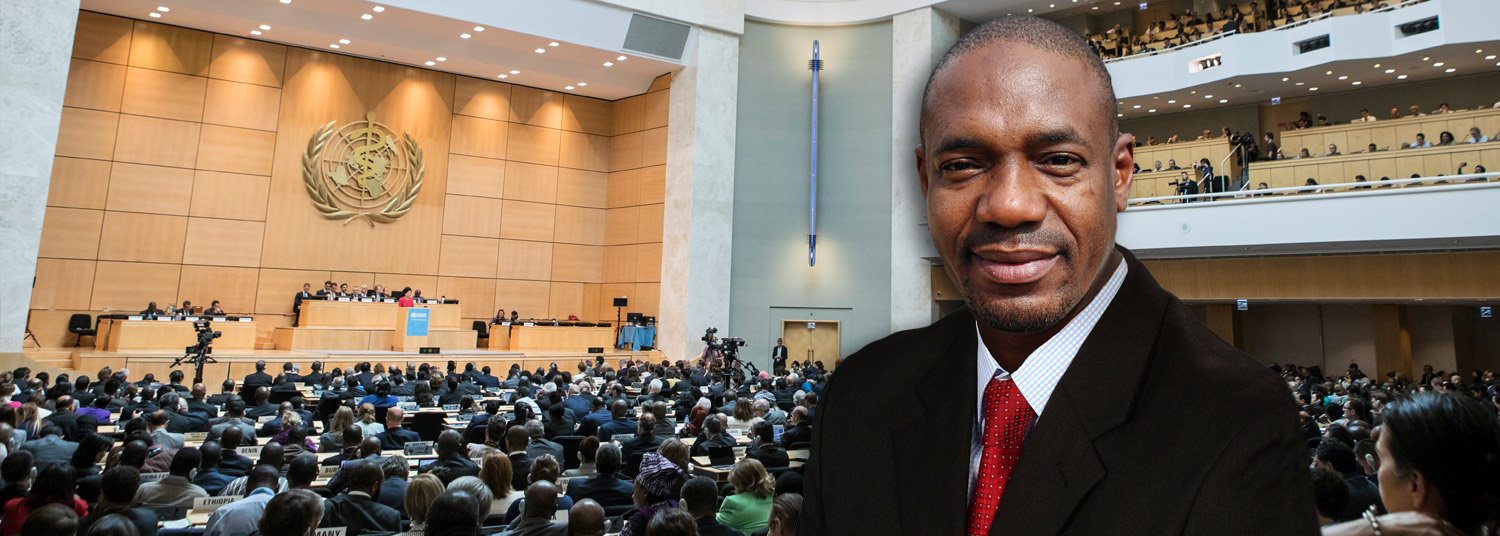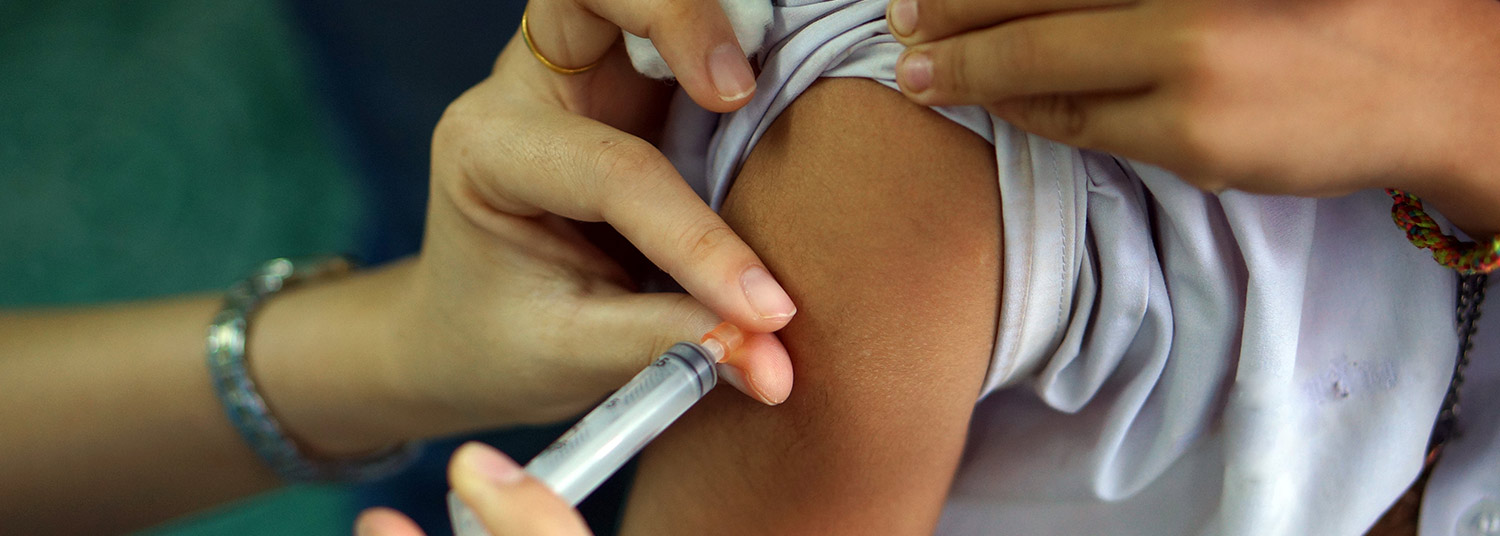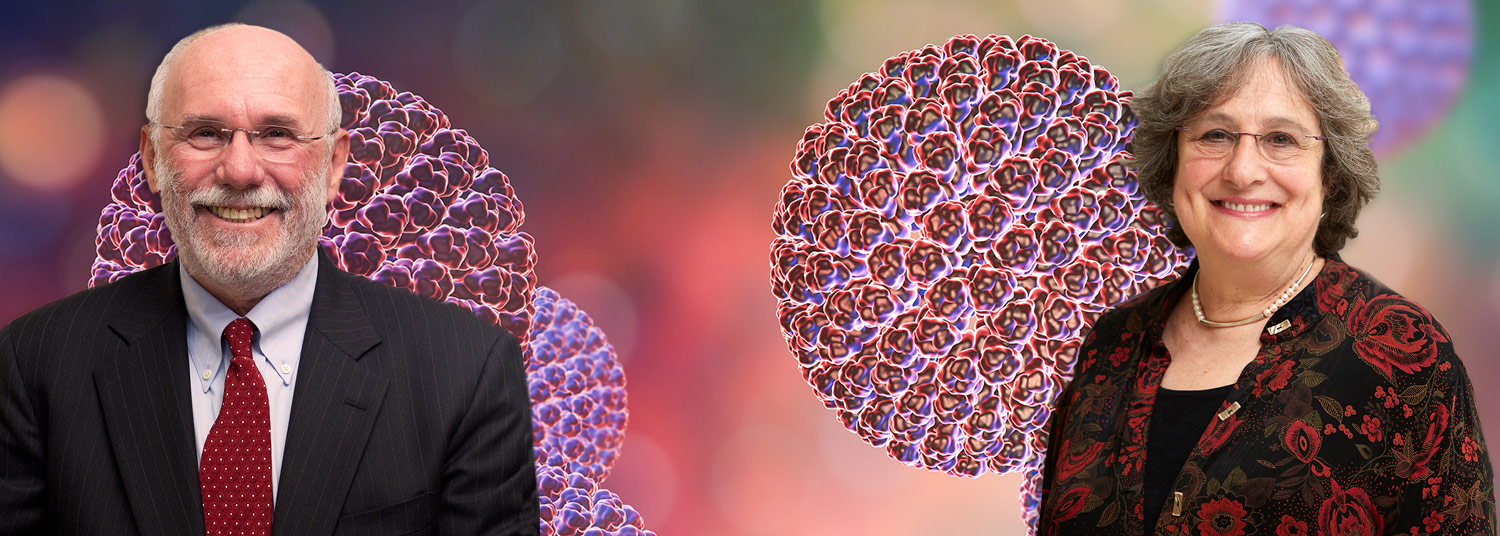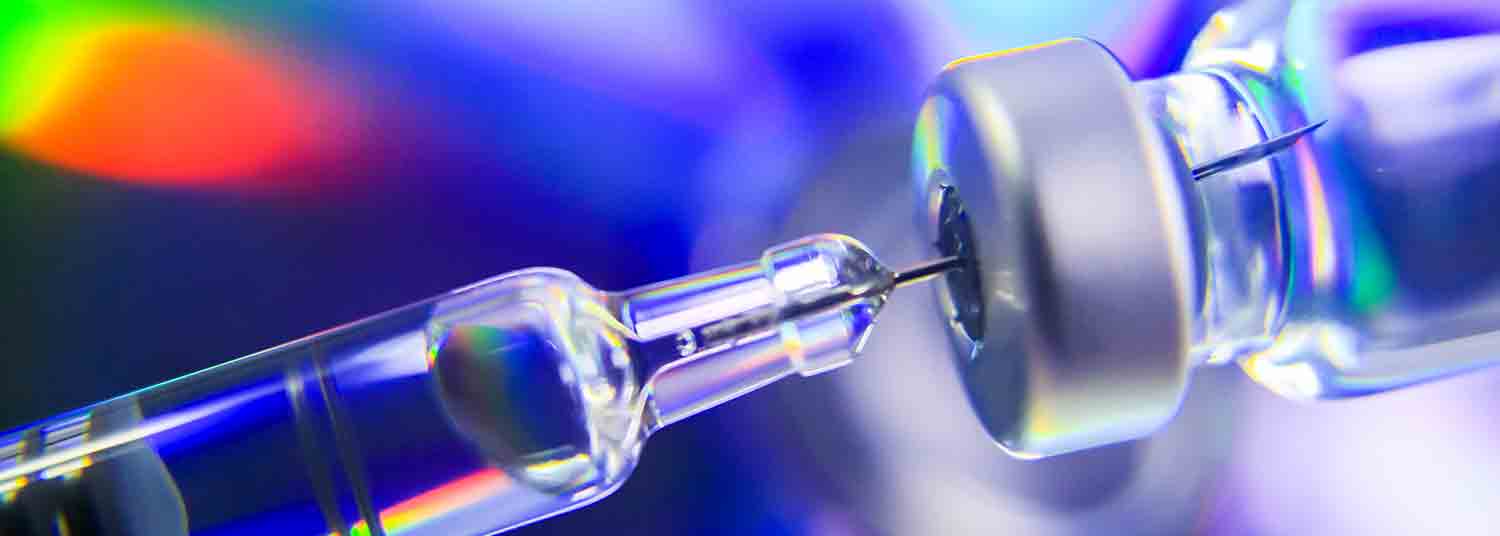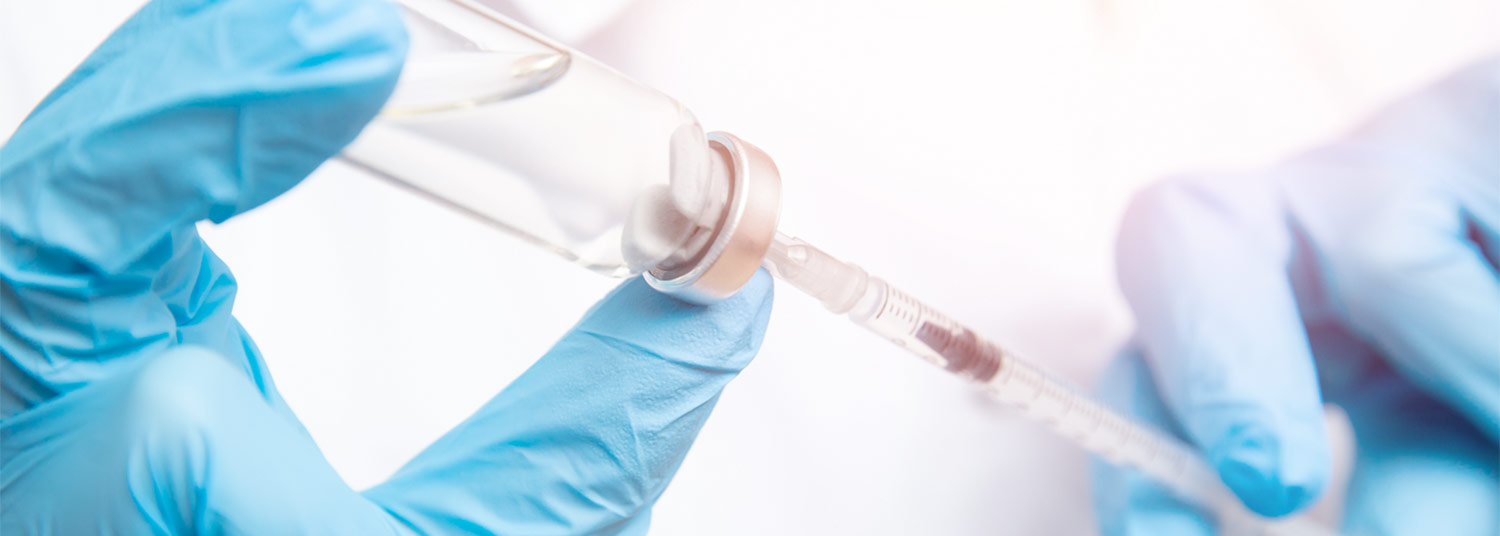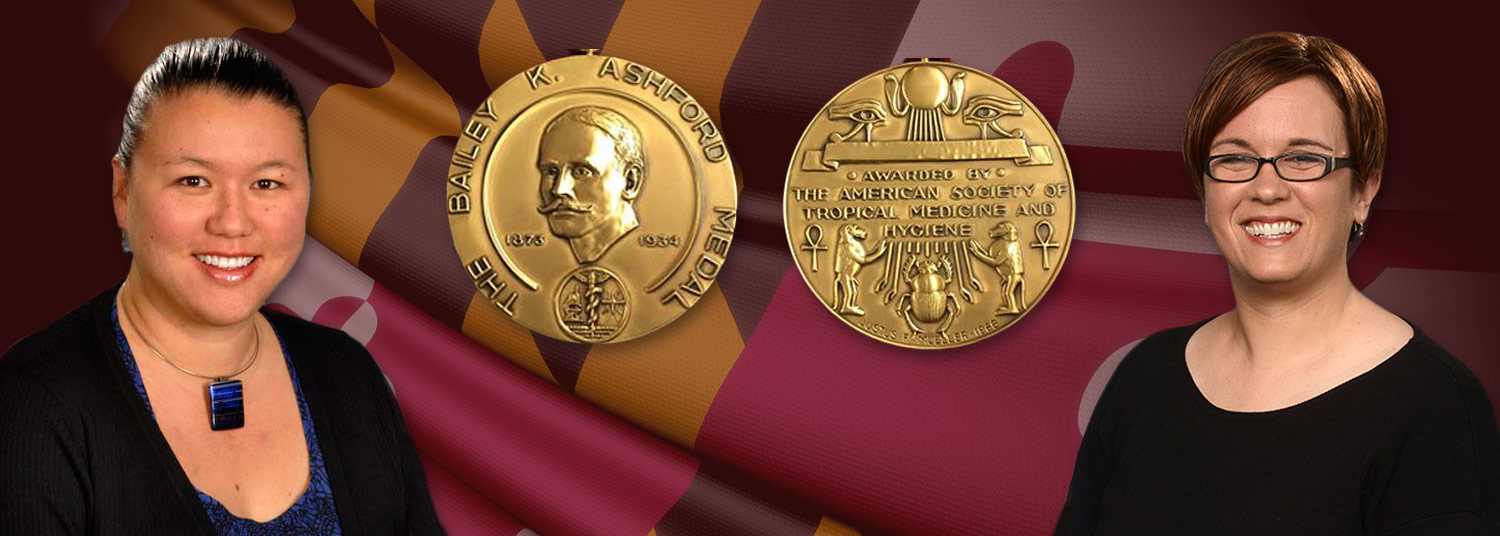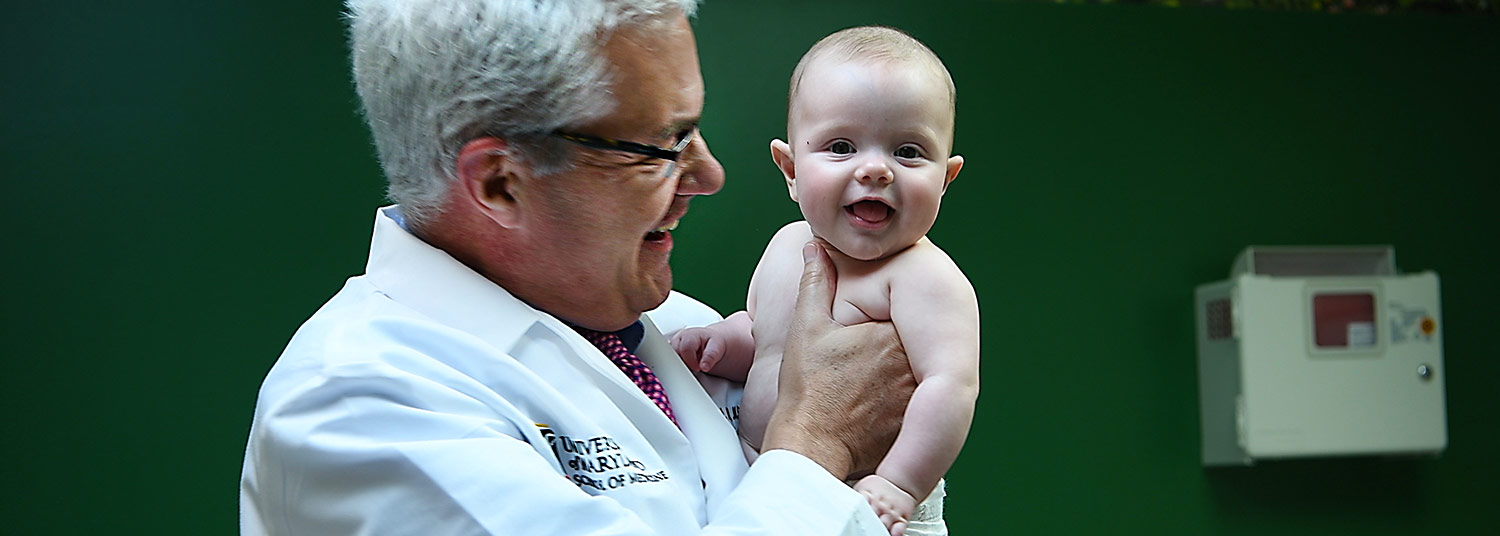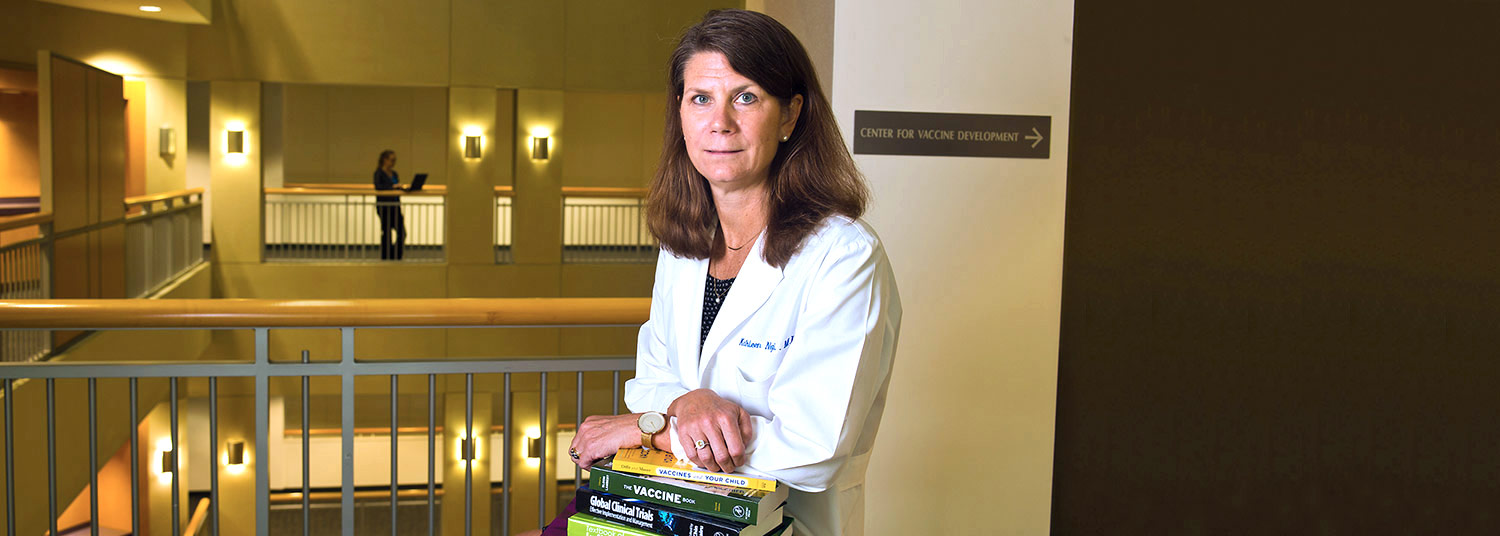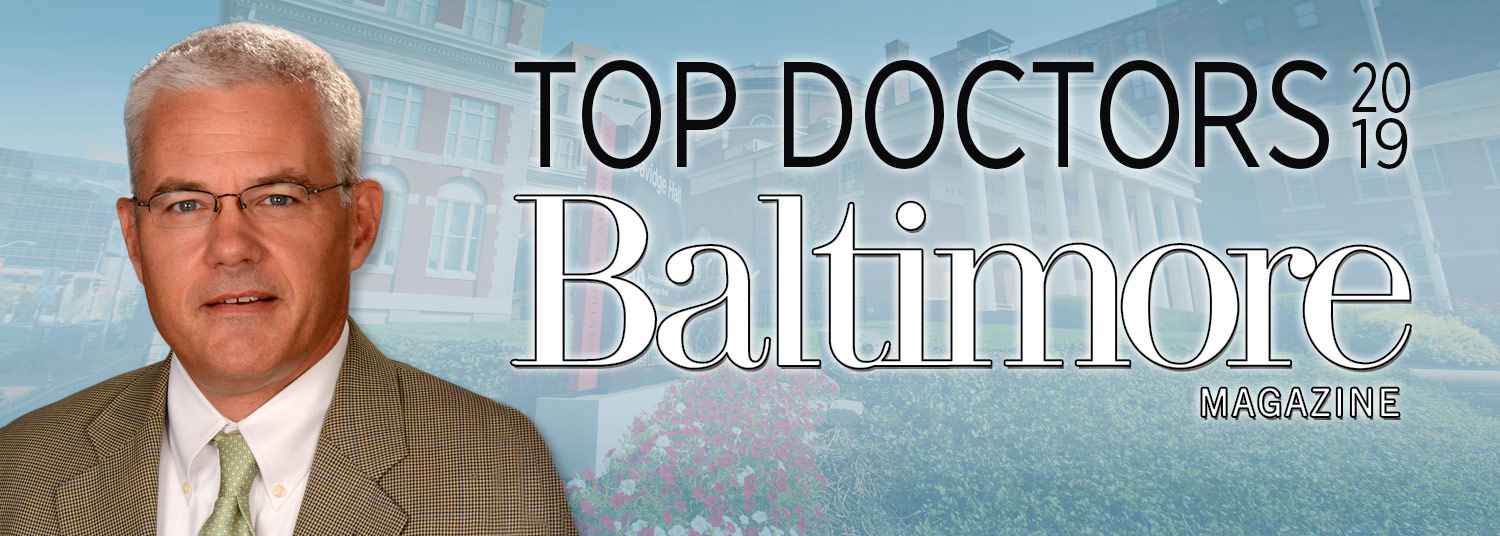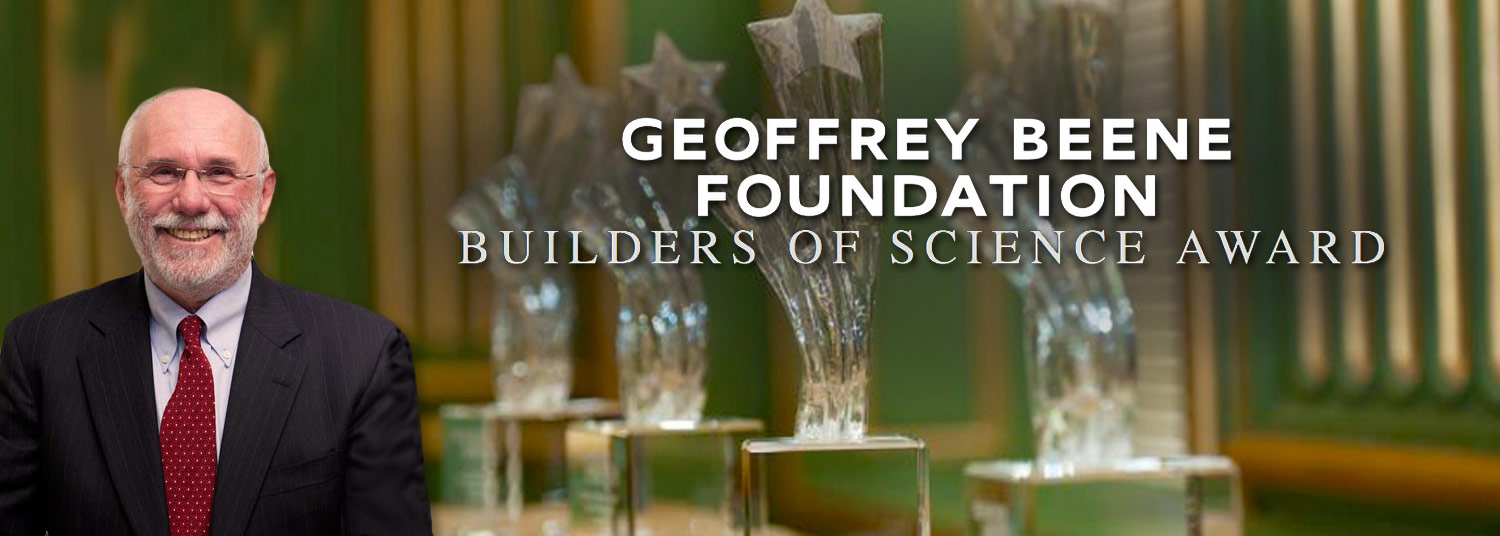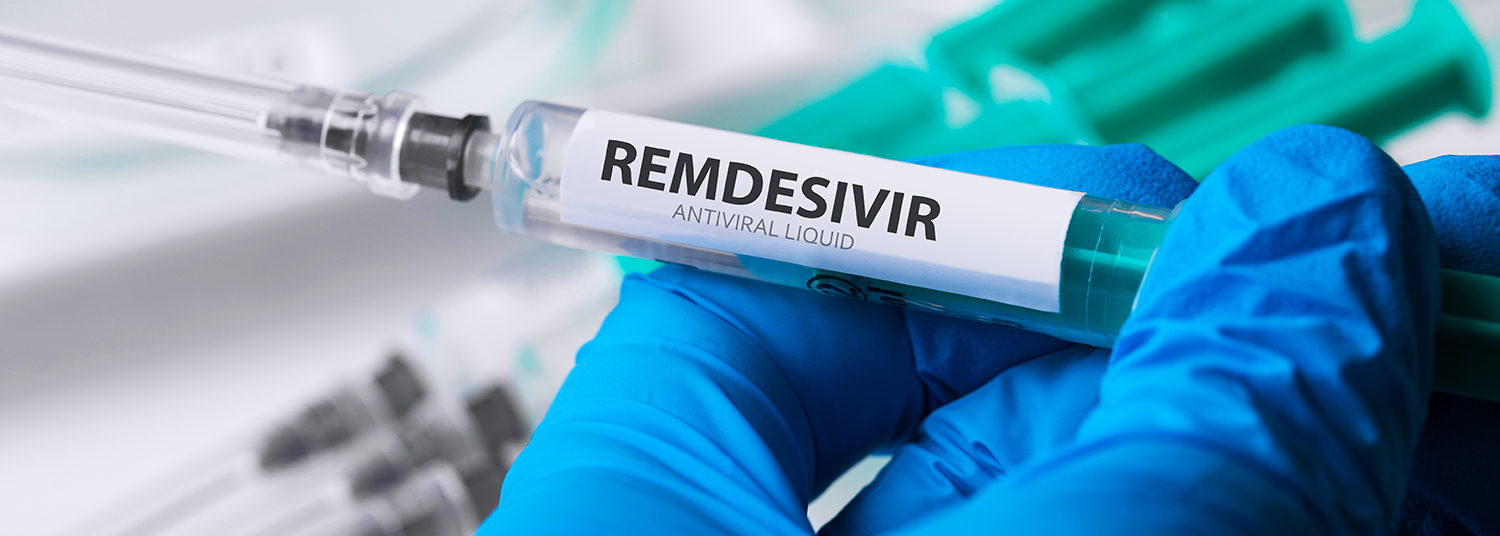April 23, 2020 | Joanne Morrison
NIAID/NIH-Sponsored Clinical Trial of Remdesivir on Hospitalized Adult COVID-19-Positive Patients with Pneumonia Will Help Provide Data for Possible FDA Licensure
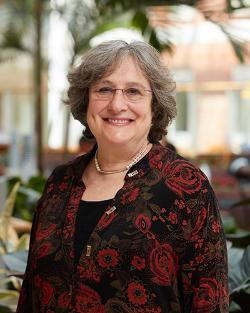 Researchers at the University of Maryland School of Medicine (UMSOM) are testing the effectiveness of the investigational antiviral drug remdesivir in hospitalized adult patients with SARS-CoV-2 (COVID-19). The randomized controlled clinical trial is evaluating the safety and effectiveness of the drug, and it is part of a national study funded by the National Institute of Allergy and Infectious Diseases (NIAID) of the National Institutes of Health (NIH).
Researchers at the University of Maryland School of Medicine (UMSOM) are testing the effectiveness of the investigational antiviral drug remdesivir in hospitalized adult patients with SARS-CoV-2 (COVID-19). The randomized controlled clinical trial is evaluating the safety and effectiveness of the drug, and it is part of a national study funded by the National Institute of Allergy and Infectious Diseases (NIAID) of the National Institutes of Health (NIH).
This research is being conducted through the UMSOM’s Center for Vaccine Development and Global Health’s (CVD), and the Vaccine and Treatment Evaluation Unit (VTEU). It is part a global multicenter National Institutes of Health-sponsored effort to evaluate this experimental treatment for COVID-19 patients with the respiratory disease, first detected in December 2019 in Wuhan, Hubei Province, China. As part of the study, the investigational antiviral drug remdesivir is being administered to patients who test positive for COVID-19 and are hospitalized at the University of Maryland Medical Center (UMMC) with pneumonia.
 Karen Kotloff, MD, Professor of Pediatrics, is the Principal Investigator and Justin Ortiz, MD, Associate Professor of Medicine, is Co-Principal Investigator for the clinical trial being conducted in Baltimore. “There are no specific therapeutics approved by the Food and Drug Administration (FDA) with proven effectiveness to treat patients with COVID-19 infection. This trial brings opportunities for our patients at the University of Maryland Medical Center (UMMC) to receive the drug under carefully controlled conditions and provide the critical data needed for licensure of remdesivir as a COVID-19 treatment by the FDA,” said Dr. Kotloff, Associate Director for Clinical Research in CVD.
Karen Kotloff, MD, Professor of Pediatrics, is the Principal Investigator and Justin Ortiz, MD, Associate Professor of Medicine, is Co-Principal Investigator for the clinical trial being conducted in Baltimore. “There are no specific therapeutics approved by the Food and Drug Administration (FDA) with proven effectiveness to treat patients with COVID-19 infection. This trial brings opportunities for our patients at the University of Maryland Medical Center (UMMC) to receive the drug under carefully controlled conditions and provide the critical data needed for licensure of remdesivir as a COVID-19 treatment by the FDA,” said Dr. Kotloff, Associate Director for Clinical Research in CVD.
The clinical trials are taking place over 30 days. Participants in the study are receiving daily intravenous (IV) infusions of remdesivir or a placebo for up to ten days or until they are discharged from UMMC. Those eligible for the trial included adults who are not pregnant and are 18 years or older with laboratory-confirmed COVID-19 as determined by a COVID-19 RT-PCR (polymerase chain reaction) test. Participants must have either radiographic pneumonia, or clinical pneumonia. Individuals with confirmed infection who have mild, cold-like symptoms, or no apparent symptoms, were not included in the study.
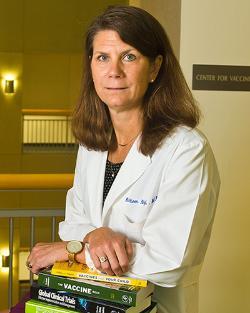 “This research into the effectiveness of remdesivir is critical as we face this growing global COVID-19 crisis. Our clinical trial will help us understand how this drug works with essential scientifically based evidence,” said Kathleen Neuzil, MD, MPH, FIDSA the Myron M. Levine MD, DTPH Professor in Vaccinology and Director of UMSOM’s CVD.
“This research into the effectiveness of remdesivir is critical as we face this growing global COVID-19 crisis. Our clinical trial will help us understand how this drug works with essential scientifically based evidence,” said Kathleen Neuzil, MD, MPH, FIDSA the Myron M. Levine MD, DTPH Professor in Vaccinology and Director of UMSOM’s CVD.
As part of the research, researchers collected nasal and/or oral swabs and blood samples four times a day over a ten-day period while the patients were hospitalized, with follow-up testing on days 15 and 29.
At present, there are no specific therapies approved by the FDA to treat people with COVID-19. This infection can cause mild to severe respiratory illness, and symptoms can include fever, cough and shortness of breath. Remdesivir, developed by Gilead Sciences Inc., is an investigational broad-spectrum antiviral treatment. It was previously tested in humans with Ebola virus disease and has shown promise in animal models for treating Middle East respiratory syndrome (MERS) and severe acute respiratory syndrome (SARS), which are also caused by other coronaviruses.
 “This clinical trial is an important step toward discovering how we can treat this novel coronavirus, which has impacted us globally. With the important collaboration among our infectious disease scientists and other experts around the world, we will hopefully discover therapies and vaccines to protect against this terrible illness,” said Dean E. Albert Reece, MD, PhD, MBA, who is also Executive Vice President for Medical Affairs, UM Baltimore, and the John Z. and Akiko K. Bowers Distinguished Professor, University of Maryland School of Medicine.
“This clinical trial is an important step toward discovering how we can treat this novel coronavirus, which has impacted us globally. With the important collaboration among our infectious disease scientists and other experts around the world, we will hopefully discover therapies and vaccines to protect against this terrible illness,” said Dean E. Albert Reece, MD, PhD, MBA, who is also Executive Vice President for Medical Affairs, UM Baltimore, and the John Z. and Akiko K. Bowers Distinguished Professor, University of Maryland School of Medicine.
A Global Effort
Clinical trials of remdesivir are also ongoing at up to 75 sites in the U.S. and internationally. Potential participants in these trials are undergoing a baseline physical exam before receiving treatment. Eligible participants are then randomly assigned either to the investigational treatment group or the placebo group. The study is double-blind, meaning that trial investigators and participants will not know who is receiving remdesivir or a placebo.
Participants in the investigational treatment group will receive 200 milligrams (mg) of remdesivir intravenously on the first day of enrollment to the study. They will receive another 100 mg each day for the duration of hospitalization, for up to 10 days in total. The placebo group will receive, at an equal volume, a solution that resembles remdesivir, but contains inactive ingredients. Researchers will regularly monitor participants and will assign them daily scores based on a predefined scale of clinical outcomes that considers factors such as temperature, blood pressure and use of supplemental oxygen, among others.
This research underway in Baltimore is supported by NIAID. For more than four decades, CVD has operated as part of NIAID’s VTEU network, testing vaccines and therapies for a broad range of infectious diseases including influenza, Ebola and Zika. In 2019, CVD was renewed as one of nine sites in the U.S. that makes up the VTEU network, with funding up to $29 million among the nine sites over the next seven years.
A key role of the CVD VTEU is to quickly respond to public health emergencies like COVID-19 by providing surge capacity and rapid trial implementation. CVD’s role is also to serve as a crucial coordinator of multicenter trials. CVD has assembled an expert and accomplished investigative team with complementary skillsets in all areas necessary to address the NIAID priority areas, including clinical research NS vaccine development. Future research may include Phase I, II, III, and IV clinical trials and studies of new and improved candidate vaccines, therapeutics, and other biologics and drugs provided by or through NIAID.
This Adaptive COVID-19 Treatment Trial (NCT042807050) is a multicenter trial sponsored by the NIAID.
About the University of Maryland School of Medicine
Now in its third century, the University of Maryland School of Medicine was chartered in 1807 as the first public medical school in the United States. It continues today as one of the fastest growing, top-tier biomedical research enterprises in the world -- with 45 academic departments, centers, institutes, and programs; and a faculty of more than 3,000 physicians, scientists, and allied health professionals, including members of the National Academy of Medicine and the National Academy of Sciences, and a distinguished two-time winner of the Albert E. Lasker Award in Medical Research. With an operating budget of more than $1.2 billion, the School of Medicine works closely in partnership with the University of Maryland Medical Center and Medical System to provide research-intensive, academic and clinically based care for nearly 2 million patients each year. The School of Medicine has more than $540 million in extramural funding, with most of its academic departments highly ranked among all medical schools in the nation in research funding. As one of the seven professional schools that make up the University of Maryland, Baltimore campus, the School of Medicine has a total population of nearly 9,000 faculty and staff, including 2,500 student trainees, residents, and fellows. The combined School of Medicine and Medical System (“University of Maryland Medicine”) has an annual budget of nearly $6 billion and an economic impact more than $15 billion on the state and local community. The School of Medicine faculty, which ranks as the 8th highest among public medical schools in research productivity, is an innovator in translational medicine, with 600 active patents and 24 start-up companies. The School of Medicine works locally, nationally, and globally, with research and treatment facilities in 36 countries around the world. Visit medschool.umaryland.edu.
About the Center for Vaccine Development and Global Health
For over 40 years, researchers in the Center for Vaccine Development and Global Health have worked domestically and internationally to develop, test, and deploy vaccines to aid the world’s underserved populations. CVD is an academic enterprise engaged in the full range of infectious disease intervention from basic laboratory research through vaccine development, pre-clinical and clinical evaluation, large-scale pre-licensure field studies, and post-licensure assessments. CVD has worked to eliminate vaccine-preventable diseases. CVD has created and tested vaccines against cholera, typhoid fever, paratyphoid fever, non-typhoidal Salmonella disease, shigellosis (bacillary dysentery), Escherichia coli diarrhea, nosocomial pathogens, tularemia, influenza, malaria and other infectious diseases. CVD’s research covers the broader goal of improving global health by conducting innovative, leading research in Baltimore and around the world. CVD researchers are developing new and improved ways to diagnose, prevent, treat, control, and eliminate diseases of global impact. Currently, these diseases include typhoid, Shigella, E. coli diarrhea, malaria, and other vaccine-preventable infectious diseases. CVD researchers have been involved in critical vaccine development for emerging pathogens such as Ebola and Zika. In addition, CVD’s work focuses on the ever-growing challenge of antimicrobial resistance.
Contact
Joanne Morrison
Director of Marketing and Public Relations
Center for Vaccine Development and Global Health
University of Maryland School of Medicine
jmorrison@som.umaryland.edu
Office: (410) 706-2884
Mobile: (202) 841-3369
Related stories
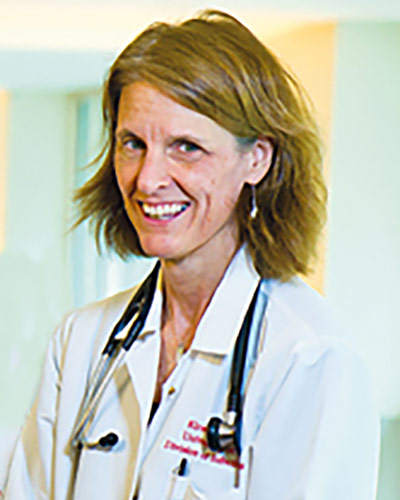
Wednesday, January 26, 2022
Trial Co-led by University of Maryland School of Medicine Scientist Confirms Safety of “Mix-and-Match” COVID-19 Vaccine Booster Dosing
A University of Maryland School of Medicine (UMSOM), Center for Vaccine Development and Global Health (CVD), expert is co-leading an ongoing study that was pivotal in recommending adults and teens receive booster COVID-19 shots of their choosing starting in fall 2021. The preliminary clinical trial results, reported today in The New England Journal of Medicine, found that is safe and effective to receive boosters that are the same or a different one from the person’s primary vaccine(s).
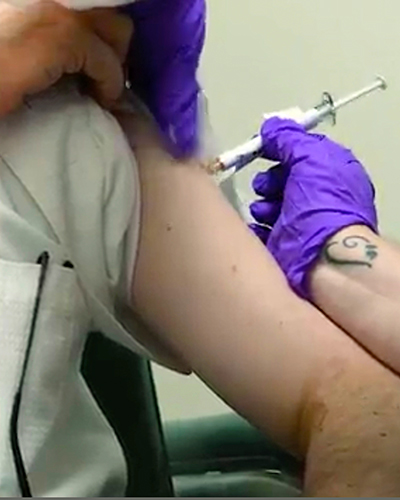
Tuesday, May 05, 2020
UM School of Medicine is First in U.S. to Test Unique RNA Vaccine Candidate for COVID-19
In a significant development in the global effort to discover a safe and effective vaccine for COVID-19, researchers at the University of Maryland School of Medicine (UMSOM) became the first in the U.S. to begin testing experimental COVID-19 vaccine candidates developed by Pfizer and BioNTech. The research, funded by Pfizer Inc., will study the safety, efficacy, and dosing of an experimental mRNA -based vaccine.
